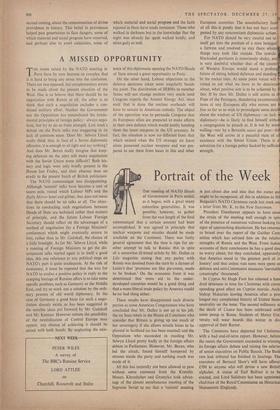A MISSED OPPORTUNITY
THE issues raised by the NATO meeting in -Paris have by now become so complex that it is hard to bring any sense into the confusion. There are two opposed, but complementary errors to be made about the present situation of the West. One is to believe that there should be no negotiation with Russia at all; the other is to think that such a negotiation excludes a con- tinued military effort. Neither the Government nor the Opposition has remembered the funda- mental principles of foreign policy : always nego- tiate, but try to do so from strength. Last week's debate on the Paris talks was staggering in its lack of common sense. Does Mr. Selwyn Lloyd really think that, in face of a Soviet diplomatic offensive, it is enough to sit tight and say nothing? And does Mr. Bevan really imagine that keep- ing defences on the alert will make negotiation with the Soviet Union more difficult? Both his- tory and logic were only briefly present in the House last Friday, and their absence does no credit to the present batch of British politicians.
The NATO communiqué was disappointing. Although 'summit' talks have become a sort of totem pole, round which Labour MPs and the Daily Mirror howl and gibber, that does not mean that there should be no talks at all. The objec- tions to conducting such negotiations between Heads of State are technical rather than matters of principle, and the future Labour Foreign Secretary should reflect on the advantages of a method of negotiation (by a Foreign Ministers' conference) which might eventually ensure to him, rather than to Mr. Gaitskell, the chance of a little limelight. As for Mr. Selwyn Lloyd, while a meeting of Foreign Ministers to get the dis- armament talks started again is in itself a good idea, this one reference to any political steps on NATO's part is quite inadequate. At the risk of monotony, it must be repeated that the way for NATO to evolve a positive policy in reply to the creeping barrage of Russian offers is to take some specific problem, such as Germany or the Middle East, and try to work out a solution by the ordi- nary process of old world diplomacy. In the case of Germany a good basis for such a nego- tiation already exists, as has been suggested in the sensible ideas put forward by Mr. Gaitskell and Mr. Kennan. However remote the ,possibility of the neutralisation of Central Europe may appear, any chance of achieving it should be seized with both hands. By neglecting the exis- tence of this diplomatic opening the NATO Heads of State missed a great opportunity in Paris.
On the other hand, Labour objections to the defence decisions taken seem singularly beside the point. The distribution of IRBMs to member States will not change matters very much until Congress repeals the Atomid Energy Act, since until that is done the nuclear warheads will have to remain in American custody. The object of the operation was to persuade Congress that its European allies are prepared to make efforts in their own defence which would justify handing them the latest weapons in the US armoury. In 'fact, the situation is now no different from that which existed when the US strategic air force alone possessed nuclear weapons and was pre- pared to use them from bases in this and other European countries. The unsatisfactory feat of all this is purely that it has not been acco panied by any concomitant diplomatic action.
For NATO should be very careful not to itself get into the position of a man besieged a fortress and resolved to stay there whate things may look like outside. The morale blockaded garrisons is notoriously shaky, an is very doubtful whether that of the countr of Western Europe would stand a prolon future of sitting behind defences and standing at the rocket sites. At some point voices will raised to ask what we have to be determin about, what positive aim is to be achieved by this. If by then Mr. Dulles is still active as Pope of the Pentagon, thundering excommuni• tions at any European ally who moves out line so far as to wish to promulgate some dou about the wisdom of US diplomacy—or lack diplomacy—he is likely to find himself witho a congregation to preach at. It is not by ston walling—nor by a Bevanite sauve qui peut—th the West will arrive at a peaceful state of c existence with the Soviet Union. There is substitute for a foreign policy backed by sufficie strength.


























 Previous page
Previous page